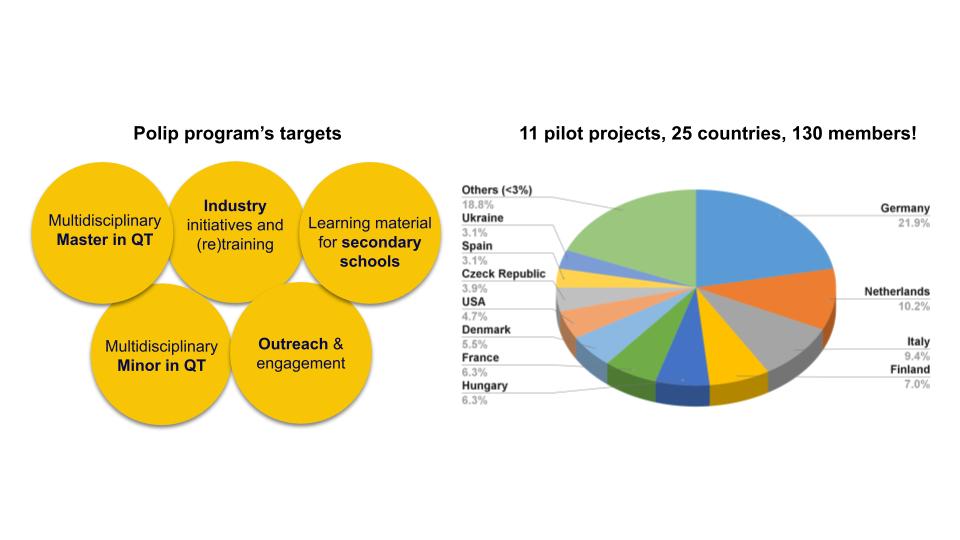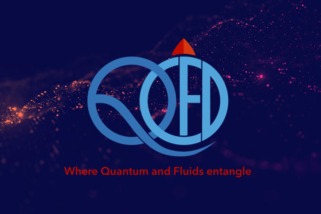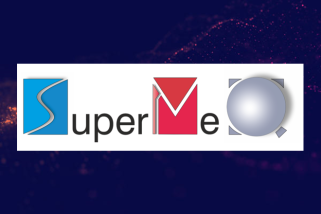CSA Projects
QTEdu- Coordination and support action for Quantum Technology Education
Join the QT Education Working Groups!
We are bringing together quantum professionals from different walks of quantum education, research, and industry to help define the future of Europe’s quantum workforce as the second quantum revolution unfolds.
Read more about the groups and register here. The information will be collected and managed by the QTEdu CSA. If you have questions, don’t hesitate to contact us (info@qtedu.eu).
Visit the new QTEdu portal
Visit the new QTEdu WEBPAGE. All education material, tools, programs and courses are collected in this new portal.
Discover more, visit the page and register as a member following the LINK.
Qualification Profiles for Quantum Technology
QTEdu group has published a collection of sample Qualification Profiles for people working in Quantum Technologies. These qualification profiles provide examples of the scope of QT competences an individual has acquired through education or further training in preparation for employment in industry. Read more in a dedicated post.
Download Qualification Profiles for Quantum Technologies

Running Pilot Projects
| Name | Abstract | Coordinators contact |
| QTEdu open outreach pilot - Quantum Technologies Education for Everyone (QuTE4E) | Our key concept is that engagement is the first and foremost step for everyone’s education, no matter the technical skills: general public, school and academic students and teachers, outreach experts, Q-tech companies, policy makers. In synergy, we will produce the essential syllabus of quantum physics concepts, conduct a Delphi study, realize joined live panels, hackathons, quantum game jams, showcasing, and the first European World Quantum Day, interconnect and thus enrich existing outreach platforms, and assess the coherence of the pilot deliverables with RRI dimensions. | Marilu Chiofalo, University of Pisa/QPlayLearn (marilu.chiofalo@unipi.it), Zeki Seskir, QWorld (zeki.seskir@qworld.net) |
| QTEdu open outreach-minor pilot - Quantum Technology in 5 Minutes (QT5M) | The QT5M proposition is the organization of a series of pan-European coherent events directed to undergraduate students to introduce them to the fascinating world of quantum technologies from the career development perspective. Thus, we aim at promoting careers in QTs as an exciting and dynamic field in which they can grow professionally. Furthermore, we want to strengthen the inclusivity of the field by increasing the visibility of women and other under-represented groups. The events will share the same platform and structure, enabling its replication beyond the pilot. | Lydia Sanmartí-Vila, ICFO (lydia.sanmarti@icfo.eu) |
| QTEdu open school pilot - Community-based development of the Quantum Concept Inventory (QCI) | Within this pilot project, we will lay the foundation for the development of the Quantum Concept Inventory, an instrument to assess students' understanding of quantum physics' and quantum technologies' key concepts in a context-independent way. Our test instrument reflecting the communities’ requirements will be of value for all upcoming European projects on teaching and learning about quantum technologies at the secondary school level, for example in the context of evaluation studies. | Philipp Bitzenbauer, University Erlangen (philipp.bitzenbauer@fau.de), Kim Krijtenburg-Lewerissa, Utrecht University (k.krijtenburg-lewerissa@uu.nl) |
| QTEdu open school pilot - Quantum Teaching Materials for Schools (Q_TeMaS) | This consortium takes a practical and didactical approach on the implementation (or improvement) of quantum topics in high schools. Our project aims to support both high school students and teachers, such that they can learn and teach the basics and the up to date concepts in quantum physics. For teachers, we want to offer courses to refresh their knowledge and to learn about the newest quantum technologies, and we also plan to strengthen the young teacher corps with teaching materials, games, lesson plans and more. For Students, we want to support them with lab visits, talks, websites with various topics, apps, etc. The principal goals of our pilot are to create an infrastructure which can offer the support mentioned above, to make an inventory of our best practices, to develop a solid network for exchanging materials and practical experiences, and to find ways to exploit our activities in a sustainable way. | Henk Buisman, Leiden university (buisman@physics.leidenuniv.nl), Alda Arias, Heidelberg university (arias@heiedu.uni-heidelberg.de) |
| QTEdu open school pilot - Development of quantum concepts via different two-state approaches (DQC-2stap) | This pilot analyses different teaching approaches via 2-state systems. The aim is to determine which context of a two-state system is best suited for which quantum concepts with a design based research process. The research will focus on students' learning processes and their learning difficulties.To this end suitable research instruments are developed. As a result researchers and students will have teaching material combining aspects of the different two-state systems in the best possible way. | Gesche Pospiech, TU Dresden (gesche.pospiech@tu-dresden.de) |
| QTEdu open school pilot - Quantum Technology PCK for Teachers (PCK) | The aim of this pilot is to pre-research the Pedagogical Content Knowledge (PCK) teachers need to teach Quantum Technology (QT). We will investigate what are the core ideas of QT targeted in each approach available within the consortium and the related PCK. The main result will be a Synoptic PCK Map of practical use for teachers and teacher educators including core ideas, examples of methods to teach them (PCK), suggestions and problems encountered during the teaching process. | Renaat Frans, University Colleges Leuven-Limburg (UCLL) (Renaat.frans@ucll.be), Erica Andreotti, University Colleges Leuven-Limburg (UCLL) (erica.andreotti@ucll.be) |
| QTEdu open school pilot - Playful Hands-on-Quantum Early Education (PHONQEE) | The aim of PHONQEE is to explore novel didactical approaches to teaching of quantum physics, spurring curiosity about quantum phenomena and stimulating scientific creativity in high school education. The ambition is to facilitate deep learning and assist the students’ assimilation of new knowledge about quantum physics by creating a cheerful learning environment and making the abstract concrete. We will do so by merging humor, tactile game-based learning, and hands-on inquisitive experiments. | Ulrich Hoff, Technical University of Denmark (ulrich.hoff@fysik.dtu.dk) |
| QTEdu open minor pilot - Introducing Quantum Technologies: A Modular Set of Actions (IQTM) | The pilot is targeting BSc level augmentation as well as a small subset of MSc level education. It addresses parallel actions covering the four pillars of quantum technologies (QT): communication, sensors, simulation and computation. It is an ambitious, short-term, small-scale initiative combining education, science, engineering and education innovation. We treat the computer science, physics and pedagogical aspects. For the latter we use methods from the QTEdu competence framework. Synergetic actions include guest lectures and joint projects. | Alexandru Paler, AaltoUniversity (alexandrupaler@gmail.com), Maria Bondani, University of Insubria (maria.bondani@uninsubria.it) |
| QTEdu open Master Pilot (QTOM) | This pilot provides an exchange and coordination platform for QT Master’s education open to all QTEdu community members. The pilot addresses cooperation between existing programs and courses involving ECTS credits; shared extra-curricular activities, career development and soft-skills training; remote internships/projects at university, research, and industry organizations; and share resources for educational staff. | Aurél Gábris, Czech Technical University (gabris.aurel@fjfi.cvut.cz), Jacob Sherson, ScienceAtHome/Aarhus University (sherson@phys.au.dk) >>>>WEBSITE>>>> https://qtom.qtedu.eu/ |
| QTEdu open master pilot - Enabling Future European Quantum Technology Experts (EFEQT) - http://efeqt.eu/ | In this pilot we will develop a model for cross-border research- and innovation-oriented training in quantum sciences and technology. This entails collaborative teaching, joint student research projects, and access to the combined educational networks of top European institutions in quantum research and education. We aim to form a cohort of motivated students and provide to them an international learning and research experience preparing them for leadership roles in the growing quantum workforce. | Martin Gärttner, Heidelberg University (martin.gaerttner@kip.uni-heidelberg.de), Shannon Whitlock, University of Strasbourg (whitlock@unistra.fr) >>>>>WEBSITE>>>>> http://efeqt.qtedu.eu/ |
| QTEdu open industry pilot - Quantum Retraining Network (QAREER) | This pilot aims to foster a quantum-ready workforce through networking, industry awareness, and (re)-training initiatives. Activity will span community meetups, events for raising awareness of quantum technologies, market research to match demand and supply in quantum technology industry workforce retraining, collaboration in course development and implementation, development of standards in learner assessment and teaching quality assurance, and monitoring grant opportunities. | Andras Palyi, Hamilton Consulting (palyi.andras@ttk.bme.hu) |
Education Section @ European Quantum Technologies Conference (EQTC) 2021
The annual conference of the EU Quantum Flagship programme, the European Quantum Technologies Conference (EQTC) 2021, has started!
It is held virtually from 29 November to 2 December 2021. It will provide full coverage of the most prominent and recent advances in European and international quantum technology activities across various topics including basic sciences, communication, computing, simulation, and sensing/metrology, infrastructure development, and education & training.
The QTEdu is coordinating contributions in the category “Education and Training in Quantum Technologies”. Several sessions of EQTC 2021 program are dedicated to education&training topics. These sessions will feature updates on QTEdu activities including the recently formed pilots as well as several community contributions focused on education.
Monday 29/11:
- Keynote session:
3:30 – 4:00PM “Quantum Flagship Activities in Education, Gender Equity & Diversity” | Video recording
Wed 01/12:
- 10:30AM – 1:30PM “Workshop 3.2: Education and Training: QTEdu Community Workshop, Schools” | Video recording
- 15:45-17:15 PM “Workshop 5.1: Education and Training: QTEdu Community Workshop, Higher Education” | Video recording
- 14:00 – 15:00 PM Parallel 5.4: “Virtual Posters – Quantum Communication, Metrology, Sensing and Education” | Abstracts
Thur 02/12:
- 09:30AM – 12:30PM “Workshop 6.3 – QTEdu community workshop & Decide game” | Video recording
- 1:30 – 2:10PM Parallel 9.1: “Invited Talks and Panel Discussion on Education in Quantum Technologies” | Video recording
Competence Framework for Quantum Technologies
In May 2021, the QTEdu consortium published the first version of the European Competence Framework for Quantum Technologies. The competence framework aims to map the landscape of competences and skills in Quantum Technologies thus establishing a common language facilitating communication and cooperation among different stakeholders in the education ecosystem. While version 1.0 presents an overview of what can be learned, the next version will also incorporate the different proficiency levels that can be reached when learning each competence and skill in Quantum Technologies, as well as job profiles with different focuses. This framework is envisioned to be a starting point for planning and structuring a variety of educational and training projects in Quantum Technologies, e.g., master programs at universities, training programs for the industry workforce, or educational research initiatives.
We used a bottom-up approach to compile this competence framework, i.e., we ran a three-round Delphi study over the last year with many participants from the QT community. The study and its first results are presented in the Quantum Flagship Newsroom article. Moreover, the results were refined by conducting expert interviews for each subfield. Details of the development can be found in the methodology and version history publication.
In the future, the competence framework will be regularly updated as the field of Quantum Technologies evolves. We see it as a living document and welcome suggestions for additions and corrections at any time. Please contact Rainer Müller and Franziska Greinert (f.greinert@tu-braunschweig.de) with your feedback.
In the long run, we envision a European quantum education community characterized by adaptability, growth, and synergies among all relevant stakeholders. Here the competence framework’s central role is to provide a common language and point of reference. We thus envision an ecosystem in which institutions can seamlessly augment their efforts with the appropriate modules, and learners can mix and match their education and training to fulfill their needs.
Download Competence Framework for Quantum Technologies
Education and outreach databases
In order to support the diverse community of learners, educators, and policymakers driving the 2nd quantum revolution Quantum Flagship created several independent databases. The new entries are welcome at any time in order to expand the community engaged in quantum science and technology education. Find out more about the databases and how to submit a new entry.
Working Groups coordination & Pilot consortia formation, May 2021
At the moment, we are coordinating the efforts in the WGs and facilitating the formation of pilot consortia in the QT Education Community. Our efforts are towards a bottom-up transparent process that we facilitated through network meetings and the use of the MiroBoard where community members could share their ideas and proposals.
You are welcome to join the community and become part of the Working Groups and the pilots.
Are you new here and want to participate? Follow these steps to join the WGs:
- Register to the Working Groups
- Create your 1-page intro slide
If you are interested in becoming part of one pilot, please follow the additional steps below. - Get all the information:
• Slides first networking meeting (16/04/2021)
• Pilot formation activities and application process - Learn more about the current open pilot consortia (May 2021-August 2022). Want to join a pilot? Contact the coordinator(s) of the pilot of your interest.
• Open Outreach pilot – contact the coordinators
• Open Schools pilot (focus: Edu research) – contact the coordinators
• Open Schools pilot ( focus: formulating concrete Edu materials) – contact the coordinators
• Open Minor pilot – contact the coordinators
• Open Master pilot – contact the coordinators
• Open Industry pilot – contact the coordinators
If you have questions about the pilots, don’t hesitate to contact info.qtedu@qtedu.eu and Grazia Bastasin (g.bastasin@tudelft.nl)
!Reminder!
Pilot Application document submission deadline: Friday 21st May 2021 (to be sent to pilots.qtedu@qtedu.eu).
QTEdu WGs Kick-off meetings, March 2021 (slides and recording)
- WG1: QT educational initiatives for primary and secondary school, and outreach | Meeting 8.03.21 | Agenda | Slides | Recording
- WG2: QT educational initiatives in higher education | Meeting 10.03.21 | Agenda | Slides | Recording
- WG3: Lifelong learning in QT (quantum workforce (re)training) | Meeting 11.03.21 | Agenda | Slides | Recording
- WG4: (Transversal) Educational research | Meeting 9.03.21 | Agenda | Slides | Recording
- WG5: (Transversal) Equity and inclusion in QT | Meeting 12.03.21 | Agenda | Slides |Recording
Why the QTEdu CSA?
The purpose of this project is to assist the European Quantum Flagship with the creation of the learning ecosystem necessary to inform and educate society about quantum technologies. The goal is that a quantum-ready society, with knowledge about and positive attitudes towards quantum technologies, will enable the emergence of a quantum-ready workforce.
The quantum community, in their Strategic Research Agenda, called for this CSA due to an immediate need for coordinated public education and outreach efforts at all levels ranging from schools, through universities, and up to the working environment and general public.
The current QTEdu CSA was founded as a result of the European call “FETFLAG-07-2020 Training and Education on Quantum Technologies” and runs from September 2020 to August 2022.
Goals:
- Community building and infrastructure support.
- Kick-start pan-European pilot programs for school and university students, industry, and the general public.
- Bottom-up construction of a roadmap towards a Pan-European Quantum Workforce
Work packages, partners and contacts:
| Work packages | Partners | Contacts |
| WP1: Building the Quantum Education Community | Aarhus University (AU), Denmark | Jacob Sherson - co-coordinator (sherson@phys.au.dk) |
| WP2: Infrastructure service: QTEdu online repository, WP5: Management | Consiglio Nazionale delle Ricerche (CNR), Italy - Coordinator | Chiara Macchiavello - coordinator (chiara@unipv.it) |
| WP3: Competence framework | Technische Universität Braunschweig (TUBS), Germany | Rainer Müller - co-coordinator (rainer.mueller@tu-bs.de) |
| WP4: Pilot programs | Technische Universiteit Delft (TU Delft), Netherlands | Grazia Bastasin (G.Bastasin@tudelft.nl) |
Useful links:
- Description of the Work Packages
- Education & Outreach databases
- Follow us on Twitter @QTEduCSA
- Follow us on Linkedin
- Project description by the European Commission
- 4 min Video presentation of the Project work packages



